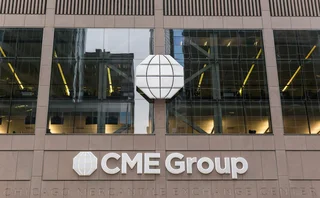
Podcast: Roos on swaptions arbitrage and benchmark reform
Benchmark reform means additional work for rates quants

In this month’s Quantcast, Thomas Roos, a London-based consultant specialising in derivatives, talks about models that produce arbitrageable swaptions prices and the crude methods firms currently use to fix them.
His new paper, Discrete time stochastic volatility, attempts to eliminate arbitrage by introducing a stochastic volatility model that is better-equipped to capture the dynamics of the underlying volatility at higher strikes.
According to Roos, most firms resort to ad hoc methods that reduce the arbitrage rather than eliminate it completely.
“Quite a few of these methods mitigate the arbitrage rather than remove it completely, and people typically just live with whatever is left over. Some more sophisticated houses use more complex solutions that are guaranteed to be arbitrage-free,” says Roos.
One reason for this might be that existing models that produce arbitrageable prices are faster and easier to implement. However, at a slightly higher cost, one can eliminate arbitrage and obtain more accurate prices, says Roos
“The main problem with arbitrage is not that it is always financially significant, but rather that it creates this nagging doubt at the back of your mind. And the volatility smile is so fundamental and it serves as an input to so many other models that you want it to be rock solid – you don’t want to worry about it,” he adds.
Roos also spoke in favour of benchmark reform, but added that it meant there is a lot of work left for rates quants to adapt their existing models to new rates and conventions.
“It really means one has additional work to do as a quant. One needs to implement the new conventions, and one also has to deal with the bases that arise from the new indices versus the old indices. But overall I think it’s a good thing people are looking at benchmarks that actually have more liquid markets and are more readily traded and observable. It doesn’t make a lot of sense to have a huge derivative market based on benchmarks that are quite thinly traded, if at all,” he added.
Index
00:00 Introduction
1:35 Current projects
3:25 Benchmark reform and impact on pricing
4:18 Motivation behind forthcoming paper
5:38 How existing methodologies fix arbitrage in swaptions prices
7:05 Advantage of new methodology over existing methods
8:41 How significant is arbitrage in swaptions prices?
11:10 Comparison to Heston model
13:38 Computational performance
15:05 Products to which the model can be applied
To hear the full interview, listen in the player above, or download. Future podcasts in our Quantcast series will be uploaded to Risk.net. You can also visit the main page here to access all tracks or go to the iTunes store to listen and subscribe.
Only users who have a paid subscription or are part of a corporate subscription are able to print or copy content.
To access these options, along with all other subscription benefits, please contact info@risk.net or view our subscription options here: http://subscriptions.risk.net/subscribe
You are currently unable to print this content. Please contact info@risk.net to find out more.
You are currently unable to copy this content. Please contact info@risk.net to find out more.
Copyright Infopro Digital Limited. All rights reserved.
As outlined in our terms and conditions, https://www.infopro-digital.com/terms-and-conditions/subscriptions/ (point 2.4), printing is limited to a single copy.
If you would like to purchase additional rights please email info@risk.net
Copyright Infopro Digital Limited. All rights reserved.
You may share this content using our article tools. As outlined in our terms and conditions, https://www.infopro-digital.com/terms-and-conditions/subscriptions/ (clause 2.4), an Authorised User may only make one copy of the materials for their own personal use. You must also comply with the restrictions in clause 2.5.
If you would like to purchase additional rights please email info@risk.net
More on Markets
Broker quoting gap keeps Eurex-LCH basis alive
Lack of differentiated prices helps retain CCP basis
QIS futures debut – but only simple ones for now
Goldman and Societe Generale kick-start Eurex market with equity baskets
Hedge funds trim US swap spreads on tariff decision
Investors cut back asset swap positions as Supreme Court ruling reignites deficit concerns
Opinions split on EU bond balance sheet squeeze
Some say QT and issuance wave will hamper intermediation; others say dealers nimble enough to respond
Eurex looks to shine ‘more light’ on off-book liquidity
Block order book initiative to aid price discovery slated for later this year
CME outage sparks FX soul search
How November’s halt exposed fragile wiring of new futures-led market structure
CME outage exposed FX market’s futures dependency, says SNB
Study finds EUR/USD spreads widened eightfold as non-bank PTFs blew out by nearly 30 times in November halt
CME rankles market data users with licensing changes
Exchange began charging for historically free end-of-day data in 2025







